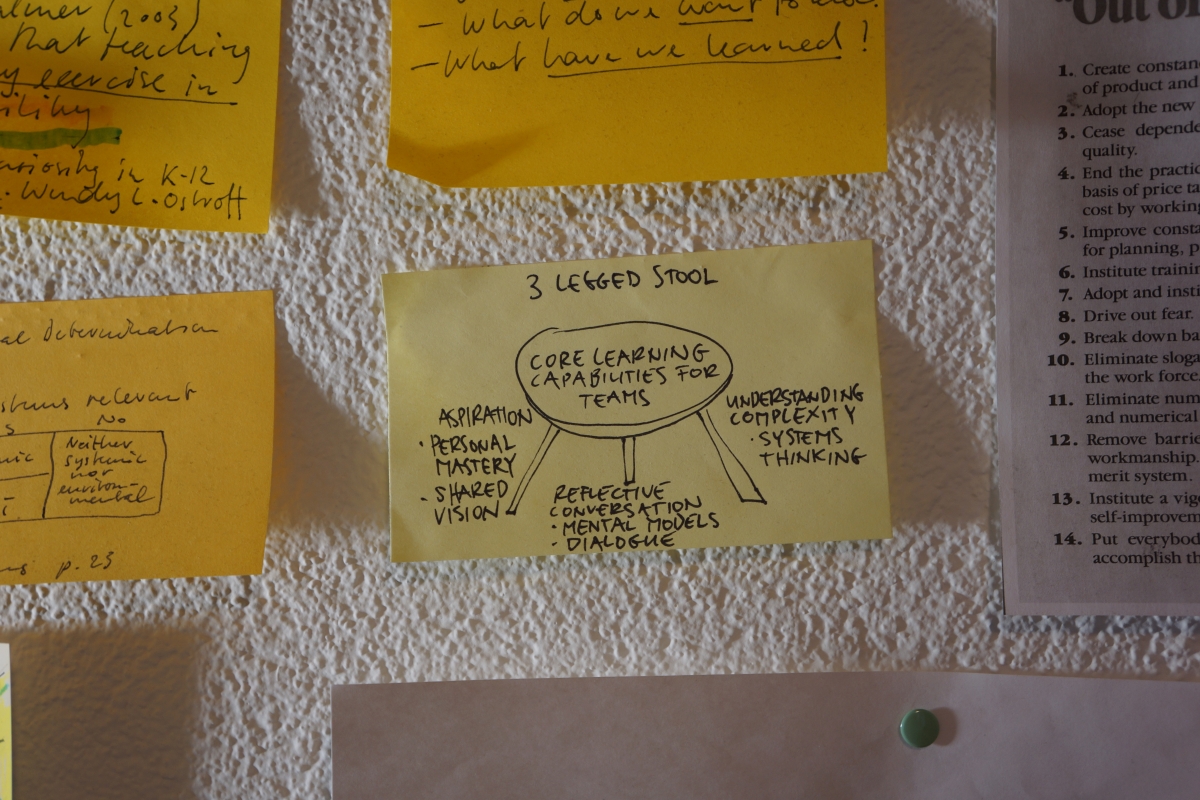What Makes Great Teams
In order to strive, progress and be happy as a team, we need to practice and continuously improve on:
- Aspiration
- Personal Mastery
- Shared Vision
- Reflective Conversation
- Dialogue
- Mental Models
- Understanding Complexity
- Systems Thinking
This is what Senge et. al1 illustrated so well with a three legged stool; it would not stand if one leg was missing.

Aspiration
The biggest (lasting) motivating factor comes from inside, the intrinsic motivation. To nourish this and make it work for ourselves and the team, we need to strive for personal mastery. We need the freedom to learn ever more about the things that interest us, becoming great at what we do. There is beauty and economy in workmanship.
To grow as a team, striving towards something like collective mastery we need a shared vision, a purpose.
We also need a strong feedback culture embedded in our work and the team, where we continuously encourage and support each other in our learning, in self reflection — collectively pushing for new heights.
Reflective Conversation
Dialogue
Effective and happy teams are teams that learn, that generate new ideas. We cannot learn with- or from each other, if we have no idea of how we think. A powerful way to get to know how we and the others think is through dialogue. This is hard work. You probably want to “get things done”, be productive and efficient. So the last thing you want is endless meetings and fruitless discussions. There can be no dialogue though without giving conversations time and space. This may seem contradictory, but this is only so at the beginning. In building our team, we need to take the time for dialogue, if we do want to harness our team’s core learning capabilities and become a highly effective team through it.
William N. Isaacs explains it well in The Power of Collective Thinking.
Mental Models
To understand eachother, to grow as a team we need to be aware of eachothers mental models, of why we believe certain things to be as they are, what constructs our ideas.
Understanding Complexity
Systems Thinking helps us grasp the complexity that is all around us. Systems Thinking is about the connections, how one thing relates to another and how they / we influence each other.
Systems thinking teaches us about the “subjectivity of objectivity” — about social facts2 and that the world is how we imagine it. The observer influences the observed, so the perception is different for you or me. Keep this in mind whenever the label “objective” is used.
Chris Argyris makes a strong point with the Ladder of Inference: our conclusions are based on the “pool of observable data”. So our conclusions can never be truly objective, whole or universal.
Autonomy
Humans need autonomy. Give it room to develop. We need self-organised systems in the workplace because hierarchies frustrate and hinder our quest for personal and collective mastery. This is not against leadership.
Leadership is positive if it is about taking the lead on an idea or topic — pushing ourselves forward while inspiring others along the way and taking responsibility for our actions. It is about “getting rid of the boss”. Which in turn will lead to questions regarding power structures in collectives, but this needs to be addressed anyway.
Hierarchies encourage waste: work gets done with the sole aim of pleasing the boss or to comply with a reporting process created inside the hierarchies to secure the hierarchical structure3.
That said, beware that newly constituted self-organising teams have a strong tendency to replicate the structures best know to them, i.e. recreating the roles and hierarchies they previously worked with4. Establishing self-organisation within existing structures can be so hard to achieve, that the attention and time it absorbs from the organization’s members carries a serious risk of actually destroying the organisation.
Diversity
Sort out the gender balance: 50/50 women and men. Stop hiring only people that are like you, look beyond your bubble or the team will become too narrow minded and boring.
-
Peter M. Senge “The Fifth Discipline, The Art and Practice of the Learning Organization” ↩
-
John Searle “The Construction of Social Reality” and “Making the Social World” ↩
-
Both Edward Deming and John Seddon have written great books on how such waste leads to economical disaster in “The New Economics for Industry, Government, Education” and “Out of the Crisis”, “Freedom From Command And Control: A Better Way To Make The Work Work” ↩
-
Stefan Kühl “Das Regenmacher-Phänomen - Widersprüche und Aberglaube im Konzept der lernenden Organisation” ↩